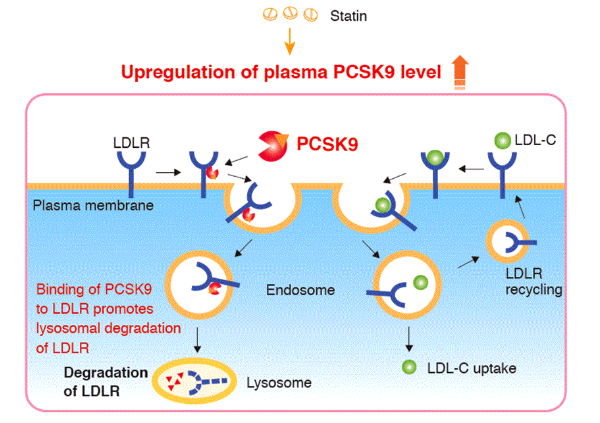Published by Deane Buckley on Jun 2, 2015 10:58:00 AM

Ever wonder how cholesterol levels are regulated? One of the major regulators is a molecule called proprotein convertase subtilisin/kexin type 9 or PCSK9 for short! PCSK9 has been implicated in causing hypercholesterolemia (high cholesterol), and diseases such as coronary heart disease1.
This blog post will get you caught up on cholesterol and research on PCSK9's role in cholesterol regulation.
- Cholesterol is an essential fat for proper cell functioning. Cholesterol is transported through the body by two types of proteins: Low density lipoproteins (LDL) and high density lipoproteins (HDL)2.
- LDL cholesterol stays in the bloodstream unless it is absorbed. LDL cholesterol needs to bind to LDL receptors in order to be removed from the bloodstream1.
- Once LDL cholesterol binds to its receptor, it is internalized into the bloodstream by endocytosis. Endocytosis is a process by which proteins and other molecules are transported into a cell by being engulfed into a fluid-filled sac called a vesicle1.
- PCSK9 is a protease which is a type of protein that helps catalyze the degradation of other proteins3.
- PCSK9 binds to LDL receptors and directs them to cellular lysosomes which can degrade LDL receptors (See above graphic of PCSK9 pathway). Therefore, decreased levels of PCSK9 can lower levels of LDL cholesterol in the bloodstream3.
- High levels of LDL cholesterol in the bloodstream can lead to many diseases such as coronary heart disease1. It is thought that inhibiting PCSK9 can lower cholesterol levels which would help treat and lower the risk of getting these diseases3.
- Many drugs are being developed that target PCSK9 to lower cholesterol. These include antibodies and siRNA3 which will be discussed in a future blog post. (Stay Tuned)
- PCSK9 levels are regulated by a protein called SREBP2 which binds to DNA and increases the amount of PCSK9 produced1.
- PCSK9 is also thought to play a role in lipid metabolism4 and susceptibility to hepatitis C infection in the liver5.
PCSK9 ELISA Kits and Antibodies
Measuring levels of PCSK9 is important for researchers who are trying to regulate cholesterol.
- Human PCSK9 ELISA Kit
- PCSK9-LDLR in vitro Binding Assay Kit
- Mouse/Rat PCSK9 ELISA Kit
- PCSK9 monoclonal antibody Application: IPP, WB
2. Nlm.nih.gov. Cholesterol Levels: What You Need to Know | NIH MedlinePlus the Magazine. 2015.
Tags:
Metabolism